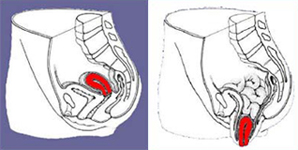

- Centro Médico Teknon
 Centro Médico TeknonHospital Quirónsalud Barcelona
Centro Médico TeknonHospital Quirónsalud Barcelona Centro Médico TeknonHospital Quirónsalud Barcelona
Centro Médico TeknonHospital Quirónsalud Barcelona
What is pelvic relaxation?
Loss of vaginal support of pelvic organs usually leads to pelvic floor disorders. Many women unnecessarily suffer from a series of disorders that lead to pelvic relaxation. The right diagnosis and specific treatment for these disorders enable the patient to recover her quality of life without the discomfort and inconvenience arising from this disfunction.

Normal genital structure - Genito-urinary prolapse
- Can pelvic relaxation be corrected?
When any of these problems arises, it is important to repair each disorder appropriately with surgery.
- What are the causes of pelvic relaxation?
Giving birth may occasion a series of disorders affecting the pelvic floor, leading to a weakening that may get worse with time, with the result that the pelvic organs may be unable to maintain their normal position.
Weakening of the muscles and disorders of the ligaments may sometimes occur in women who have never had children. In these cases, the causes could be:
- Changes in collagen
- Congenital weakness of the supporting muscles and tissue
- Exhaustion of the supporting tissue due to chronic coughing
- Unusual increases in abdominal pressure
- Obesity
- The menopause, due to lower oestrogen levels
- What is the purpose of laser-asisted vaginal rejuvenation?
Its purpose is to effectively improves muscular tone and increase elasticity and control of the vagina. It also reduces the internal and external diameters of the vagina and strengthens the perineal body (the area between the genital organs and the anus).
- What effect does vaginal relaxation have on sexual pleasure?
According to Masters and Johnson, sexual satisfaction for women is directly related to the amount of friction generated, which can be improved by means of these surgical techniques.
Vaginal relaxation consists in the weakening of muscles and the lack of muscle tone, elasticity and control. The internal and external diameters of the vagina increase. The muscles of the perineum therefore lack the necessary support. In these circumstances the vagina is no longer in optimum physiological condition, and as a result sexual pleasure is diminished.
- Vaginal rejuvenation and improvement of sexual pleasure
Laser vagina rejuvenation is designed to improve sexual gratification for women who lack the overall optimum structure of the vagina. It reconstructs the most important area for sexual pleasure, which is the outer third of the vagina. This is achieved by strengthening the muscles and fascia and eliminating excess vaginal mucous, both in the upper and lower part of the vagina.
This provides the required rejuvenating support and reduces the inner and outer diameters of the vaginal canal, which results in greater sexual pleasure. This procedure also reconstructs the muscles and fascia of the perineal body, giving greater support, muscle tone and control. It also enhances sensitivity in the opening of the vagina.
- Other surgical procedures
- Designer Laser Vaginoplasty: aesthetic enhancing of the structure of the vulva by surgical means.
- Laser Reduction Labioplasty: aesthetic sculpturing of the labia minora (or inner labia) when these are too large or of unequal length, according to the requirements of the patient. It can also repair the effects of the aging process, childbirth trauma or other lesions.
- Laser Perineoplasty: it can rejuvenate a flaccid perineum as well as enhancing the relaxed labia majora (outer lips) and the labia minora. This procedure can also provide a more aesthetic, younger-looking vulva.
- Augmentation Labioplasty: the labia majora can recover a younger look by removing a small amount of fat from the patient's body and transplanting it into the labia majora by liposculpturing.
- Hymenoplasty (reconstruction of the hymen): virginity can be lost due to sexual relations, exercise or sport. In these cases, virginity can be recovered by repairing the hymen.



































